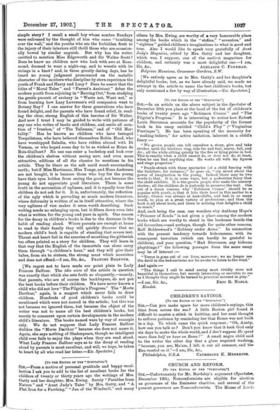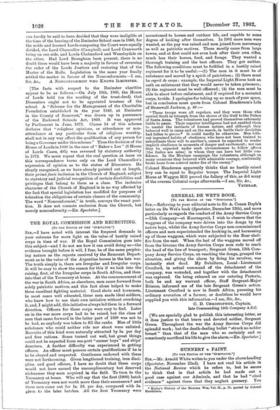CHURCH AND REFORM.
[To THE EDITOR OF THE "SPECTATOR") SIR,—IInfortunately for Mr. Bardsley's argument (Spectator, December 13th), Nonconformists are eligible for election as governors of the Ilminster charities, and several of the present governors are Nonconformists. The House of Loi.c13
can hardly be said to have decided that they were ineligible at the time of the hearing of the Ilminster School case in 1860, for the noble and learned Lords composing the Court were equally divided, the Lord Chancellor (Campbell) and Lord Cranworth being on one side, and Lords Chelmsford and Wensleydale on the other. Had Lord Brougham been present, there is no doubt there would have been a majority in favour of reversing the order of the Lords Justices and restoring that of the Master of the Rolls. Legislation in the same year finally settled the matter in favour of the Nonconformists.—I am,
&c., A NONCONFORMIST WHO KNOWS ILMINSTER.
[The facts with respect to the Ilminster charities appear to be as follows :—On July 19th, 1860, the House of Lords held (on the wording of the trust-deed) that Dissenters ought not to be appointed trustees of the school. A "Scheme for the Management of the Charitable Foundation established in the year 1549, at Ilminster in the County of Somerset," was drawn up in pursuance of the Endowed Schools Act, 1869. It was approved by Parliament in June, 1873. Clause 14 of this scheme declares that "religious opinions, or attendance or non- attendance at any particular form of religious worship, shall not in any way affect the qualification of any person for being a Governor under this scheme." Thus the decision of the House of Lords in 1860 in the case of "Baker v. Lee" (8 House of Lords Cases, 495) was reversed by statutory authority in 1873. We must repeat that the real question at issue on this correspondence turns only on the Lord Chancellor's expression of opinion as to the status of Dissenters. He clearly recognised, as we have already pointed out at length, their prina facie inclusion in the Church of England, subject to statutory and judicial recognition of certain disabilities and privileges that belong to them as a class. The inclusive character of the Church of England is in no way affected by the fact that special legislation has modified for purposes of toleration the obligations of certain classes of the community. The word "Nonconformist," in truth, conveys the exact posi- tion. It does not connote exclusion from the Church, but merely nonconformity.—En. Spectator.]







































 Previous page
Previous page